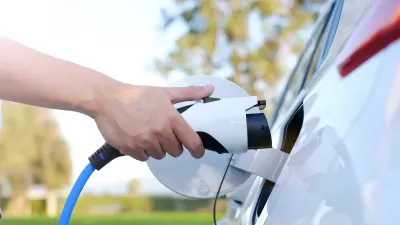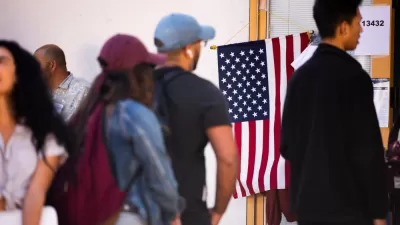In this testimonial to Congress, the Brookings Institution's Robert Puentes argues that housing and transportation are irreversibly linked and that, in the face of the current recession, more integrated planning is needed.
"This economic crisis has been exacerbated by a rapid fluctuation in gas prices and transportation costs that likewise brought the urgency of energy and environmental sustainability challenges into clear focus. While gas prices have dropped along with the economy's performance, no serious analyst believes that they will not rebound to even higher levels; therefore, even after the fixes from the American Recovery and Reinvestment Act of 2009 take hold, much more action will be needed to address the twin threats of high transportation costs and destabilized housing markets.
As Congress works to repair our financial markets, it will also have to jump start our economy. That quick start requires policymakers to focus on the basics and to further direct efforts on the metropolitan areas where those basics are concentrated. Yet as the federal government focuses, it has to change its approach to governance as well. As it turns out, the current moment of economic crisis is the right time to be talking about getting more efficiency out of the existing system by linking transportation, housing, and land use."
FULL STORY: Supporting Integrated Planning and Decision Making by Joining Up Housing and Transportation

Manufactured Crisis: Losing the Nation’s Largest Source of Unsubsidized Affordable Housing
Manufactured housing communities have long been an affordable housing option for millions of people living in the U.S., but that affordability is disappearing rapidly. How did we get here?

Americans May Be Stuck — But Why?
Americans are moving a lot less than they once did, and that is a problem. While Yoni Applebaum, in his highly-publicized article Stuck, gets the reasons badly wrong, it's still important to ask: why are we moving so much less than before?

Research Shows More Roads = More Driving
A national study shows, once again, that increasing road supply induces additional vehicle travel, particularly over the long run.

Judge Halts Enforcement of Anti-Homeless Laws in Grants Pass
The Oregon city will be barred from enforcing two ordinances that prosecute unhoused residents until it increases capacity and accessibility at designated camping sites.

Advancing Sustainability in Los Angeles County Schools
The Los Angeles County Office of Education’s Green Schools Symposium brings together educators, students, and experts to advance sustainability in schools through innovative design, climate resilience strategies, and collaborative learning.

Using Old Oil and Gas Wells for Green Energy Storage
Penn State researchers have found that repurposing abandoned oil and gas wells for geothermal-assisted compressed-air energy storage can boost efficiency, reduce environmental risks, and support clean energy and job transitions.
Urban Design for Planners 1: Software Tools
This six-course series explores essential urban design concepts using open source software and equips planners with the tools they need to participate fully in the urban design process.
Planning for Universal Design
Learn the tools for implementing Universal Design in planning regulations.
City of Moreno Valley
Institute for Housing and Urban Development Studies (IHS)
City of Grandview
Harvard GSD Executive Education
NYU Wagner Graduate School of Public Service
City of Cambridge, Maryland
Newport County Development Council: Connect Greater Newport





























